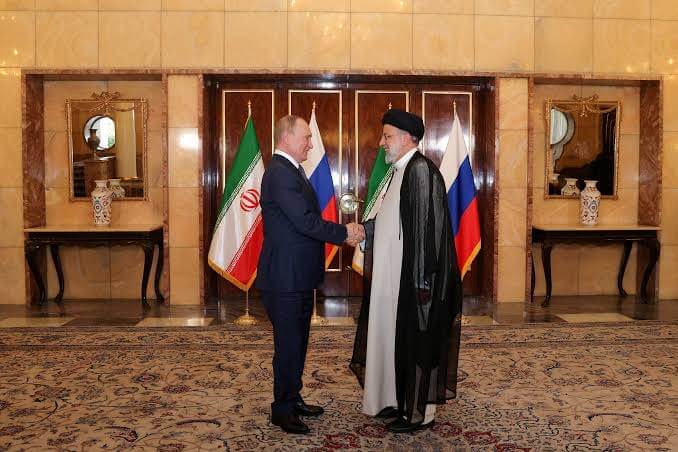Russian President Vladimir Putin and his Iranian counterpart Ebrahim Raisi took part in a ceremony via videoconference to sign a cooperation agreement on financing the design, construction, and supply of goods and services for the Rasht-Astara railway line in Iran, aimed at boosting transport via the International North-South Transport Corridor (INSTC).
Overview
Russian Transport Minister Vitaly Savelyev and Iranian Minister of Roads and Urban Development Mehrdad Bazrpash signed the deal in Tehran on Wednesday. The Rasht-Astara railway is a crucial link in the corridor that aims to connect Russia, Iran, Azerbaijan, India, and other countries through rail and water. According to Russia, this route can compete with the Suez Canal as a crucial global economic route.
Rasht, which is close to the Caspian Sea, and Astara, which is on the border with Azerbaijan, will be connected by the 162-kilometre railway. When finished, the rail link will make it possible to transport freight from the Persian Gulf to Helsinki, Finland, via Saint Petersburg, Russia.
The Russian Federation will make an investment of €1.6 billion in this railway route in accordance with this agreement. This crucial rail line is expected to be completed in 48 months.
Iran and Russia have signed an agreement on the construction of the Rasht-Astara railway, a strategic transport corridor that connects the existing railways of the two countries and Azerbaijan. https://t.co/jQgMR9STih
— Press TV (@PressTV) May 17, 2023
According to Raisi, the agreement on the Rasht-Astara railway represents “a major and strategic development” in Iran and the Russian Federation’s partnership. He praised Putin for supporting the initiative and stated that the entire region would benefit from the completion of the INSTC, not just Iran and Russia.
Speaking at the ceremony, Putin stated that the Rasht-Astara railway would transform and diversify global transit lines. He noted that the INSTC corridor would significantly contribute to ensuring food security in Iran and the Persian Gulf region.
Putin also expressed gratitude to Ayatollah Seyyed Ali Khamenei, the Supreme Leader of the Islamic Revolution, for supporting the strengthening of ties between Iran and Russia.
Significance of the Tehran-Moscow Rail Agreement
Russia and Iran are subject to international trade sanctions. The 7,200-kilometre-long freight network of roads, rails, and ships avoids the Suez Canal, which connects the Mediterranean and the Red Sea and would otherwise transport some Russian seaborne cargo.
Russia considers the corridor a potential alternative to the Suez Canal, a far longer route for trade with northern Europe. Iran has played a significant role in the INSTC and will benefit significantly from the partnership. The Raisi government has greatly valued transportation, becoming a major income generator.
The construction of the Rasht-Astara railway has been put on hold for many years due to financial, engineering, and logistical challenges. In his July 2022 meeting with Putin in Tehran, Khamenei emphasised the significance of completing the construction.
US Says Iran, Russia Are Expanding Military Ties https://t.co/6lvuUBaLSS
— Voice of America (@VOANews) May 16, 2023
Strengthening Ties Amid Western Sanctions
Putin stated that Russia and Iran “attach paramount importance to strengthening their economic and trade ties” as well as their bilateral relations in general. Since its invasion of Ukraine in February 2022, Moscow has been subject to harsh Western sanctions.
Tehran, already under sanctions for its nuclear activities and human rights violations, has been targeted with further Western sanctions amid allegations that it has supplied Russia with attack drones for use in the war, which Tehran denies.
Tehran and Moscow have taken steps to reinforce cooperation in critical sectors to sustain their economies in the face of sanctions.
On Tuesday, Russian Deputy PM Alexander Novak went to Iran and met with the oil minister of the Islamic Republic to talk about “new projects” in oil and gas exploration. In a statement, the Iranian minister, Javad Owji, stated that Russian firms were “currently... investing in seven Iranian oil fields, and we agreed with Mr. Novak that Moscow will invest in the development of six other oil fields.” Novak also stated that the two nations have established a target of expanding rail freight productivity to 15 million tonnes annually by 2030.
VTB, Russia’s second-largest bank, has launched a representative office in Iran, as the two nations work to integrate their banking networks to evade sanctions. In January, the two nations signed an agreement to connect their interbank messaging networks. Due to Western sanctions, both countries have been cut off from SWIFT, a leading financial messaging service based in Belgium.
Washington warned on Tuesday that the two sanctioned countries were “expanding their unprecedented defence partnership.” John Kirby, a spokesperson for the US National Security Council, stated, “Interactions between Iran and Russia in matters regarding the selling of advanced weapons, especially more advanced UAVs, are now continuing.”

